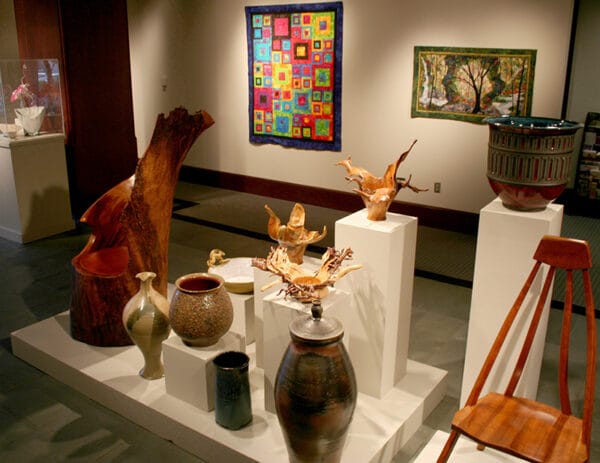Alabama State Council on the Arts
The Alabama State Council on the Arts (ASCA) is the state’s official arts agency. The organization works to enrich and preserve the cultural heritage of the state and act as the primary grant-making organization for a range of artistic endeavors, including folk art, theatre, and literature. ASCA manages and distributes state and federal funding for projects by local arts organizations, local communities, and individuals.
 ASCA Logo
The Alabama State Council on the Arts was given initial operating status through a 1966 executive order by Gov. George C. Wallace and was formally established by legislative act the following year. The primary purpose of the council is reflected in its mission statement. It aims to “enhance the quality of life in Alabama culturally, economically and educationally by supporting the state’s diverse and rich artistic resources.” In addition, the council receives and disburses federal funds from the National Endowment for the Arts (NEA) as part of a federal-state partnership aimed at providing grant support to not-for-profit arts and arts-programming organizations, schools, and artists.
ASCA Logo
The Alabama State Council on the Arts was given initial operating status through a 1966 executive order by Gov. George C. Wallace and was formally established by legislative act the following year. The primary purpose of the council is reflected in its mission statement. It aims to “enhance the quality of life in Alabama culturally, economically and educationally by supporting the state’s diverse and rich artistic resources.” In addition, the council receives and disburses federal funds from the National Endowment for the Arts (NEA) as part of a federal-state partnership aimed at providing grant support to not-for-profit arts and arts-programming organizations, schools, and artists.
ASCA came into existence during a national movement to promote artistic achievement that also saw the creation of the NEA in Washington, D.C., in 1965. Part of the NEA’s mission was to provide a percentage of its budget to each state with an administering agency. The law also stipulated that participating states had to match the funds, at least dollar for dollar. Within a few years of ASCA’s creation, all 50 states and the five U.S. territories had established a state arts agency to receive NEA grants. Alabama and other states gradually increased appropriations, and by the mid-1970s state arts agencies were providing substantial funding for the arts in the United States. Between 1968 and 1978, for example, ASCA’s budget increased from $50,000 to $300,000. The financial commitment from Alabama’s legislature has continued to grow and for fiscal year 2008, the agency’s budget reached $5.8 million.
As an independent state agency, ASCA is governed by established state administrative policies but is also overseen by a 15-member council with policy authority appointed by the governor. The council, similar to a board of directors, assigns grant funds and approves programs; adopts long-range plans that establish agency goals and objectives; hires the executive director; and formulates bylaws that provide an operational structure for a unique state function. The agency is located in Montgomery and has a full-time staff of 17, which administers programs and provides services to grantees. Grant programs and services include the performing, visual, and literary arts and encompass arts education, folk arts, and community arts development, as well as assistance to underserved audiences, cultural facilities, and individual artists.
 ASCA Gallery
The bulk of ASCA’s annual budget comes from an annual appropriation from the Education Trust Fund, which provides monies to schools, state universities, and agencies with a strong education function. The remainder is derived from a Partnership Grant awarded annually from the NEA and contributions from the Arts Tax Check-Off program. This provision on state income-tax forms allows taxpayers due a refund to contribute all or some of that refund to the arts or other designated causes. In turn, ASCA typically awards grants that range from between $500 and $150,000 that help support a broad range of arts organizations, community arts activities, arts education projects, and the work of individual artists. In recent years the council has awarded more than 350 grants to 275 different nonprofit organizations, schools, and arts programming groups, in excess of $3.2 million. Individual grants have ranged from operating support for the Alabama Symphony to artist fees for the Jerry Brown Folklife Festival. Since its inception in 1967, ASCA has awarded thousands of grants totaling millions of dollars.
ASCA Gallery
The bulk of ASCA’s annual budget comes from an annual appropriation from the Education Trust Fund, which provides monies to schools, state universities, and agencies with a strong education function. The remainder is derived from a Partnership Grant awarded annually from the NEA and contributions from the Arts Tax Check-Off program. This provision on state income-tax forms allows taxpayers due a refund to contribute all or some of that refund to the arts or other designated causes. In turn, ASCA typically awards grants that range from between $500 and $150,000 that help support a broad range of arts organizations, community arts activities, arts education projects, and the work of individual artists. In recent years the council has awarded more than 350 grants to 275 different nonprofit organizations, schools, and arts programming groups, in excess of $3.2 million. Individual grants have ranged from operating support for the Alabama Symphony to artist fees for the Jerry Brown Folklife Festival. Since its inception in 1967, ASCA has awarded thousands of grants totaling millions of dollars.
Over the course of its history, the council has forged numerous partnerships with statewide arts-service organizations with mutual goals, including Alabama Writers Forum, the Alabama Alliance for Arts Education, Design Alabama, the Alabama Dance Council, the Alabama Folklife Association, and the Alabama Crafts Council. Such partnerships expand the agency’s ability to address needs and accomplish major objectives without overburdening its resources and staff. Programs sponsored by the partnerships include the Alabama Dance Summit, Open Door (a writer-in-residence initiative), the Community Folklife Scholars Institute, the Mayor’s Design Institute, the Imaginative Learning Workshops for teachers, and the Alabama Red Clay Survey for Craftsmen.
ASCA maintains a website that provides current and historical information about the agency and the arts in Alabama. The site gives up-to-date information about grant allocations, council members, staff, guidelines, exhibition schedules, news, and links to other art-oriented sites. The Arts Alabama website also provides access to past publications and a large collection of materials associated with the Alabama Center for Traditional Culture, a division of ASCA.
 Alabama Arts Magazine
ASCA’s ongoing long-range planning includes a variety of special projects aimed at addressing particular needs in areas such as arts education, outreach to underserved, preserving folk traditions and civic revitalization. ASCA also seeks to take advantage of important statewide opportunities, including international cultural exchange and cultural tourism stimulated by the Year of Alabama Arts in 2007. Thus the council has adopted a proactive strategy in addressing areas of local need, where resources are limited, and in targeting goals aimed at statewide growth. Such initiatives include the creation of the Alabama Center for Traditional Culture, the Arts Leadership Institute, the Alabama Artists Gallery, the Visual Arts Achievement Program, the Celebration of the Arts Awards Program, the Black Belt Arts Initiative, the Alabama Arts publication, the Traditional Music of Alabama CD Series, the Alabama Masters publication, and the Alabama Arts Radio Series.
Alabama Arts Magazine
ASCA’s ongoing long-range planning includes a variety of special projects aimed at addressing particular needs in areas such as arts education, outreach to underserved, preserving folk traditions and civic revitalization. ASCA also seeks to take advantage of important statewide opportunities, including international cultural exchange and cultural tourism stimulated by the Year of Alabama Arts in 2007. Thus the council has adopted a proactive strategy in addressing areas of local need, where resources are limited, and in targeting goals aimed at statewide growth. Such initiatives include the creation of the Alabama Center for Traditional Culture, the Arts Leadership Institute, the Alabama Artists Gallery, the Visual Arts Achievement Program, the Celebration of the Arts Awards Program, the Black Belt Arts Initiative, the Alabama Arts publication, the Traditional Music of Alabama CD Series, the Alabama Masters publication, and the Alabama Arts Radio Series.
Planning is also an important function of ASCA as it seeks to guide future efforts among stakeholders in the Alabama arts community and the state government. In 1992, ASCA began producing “A State Blueprint for Supporting the Arts in Alabama,” a planning document that describes directions in the agency’s funding philosophy, mission, goals, and strategies for nurturing Alabama’s cultural resources. The report includes an assessment of needs, issues, conditions, and priorities relative to public policy and financial assistance and serves as a guide for grants, program development, and start-up initiatives. Support for the arts in Alabama has grown at every level, which suggests that public officials, business executives, and community leaders have been influenced by the principles advocated by the planning document and ASCA’s advocacy. As Alabama moves into the twenty-first century the arts will continue to play an important role in enhancing the quality of life for Alabama’s diverse and changing population.



